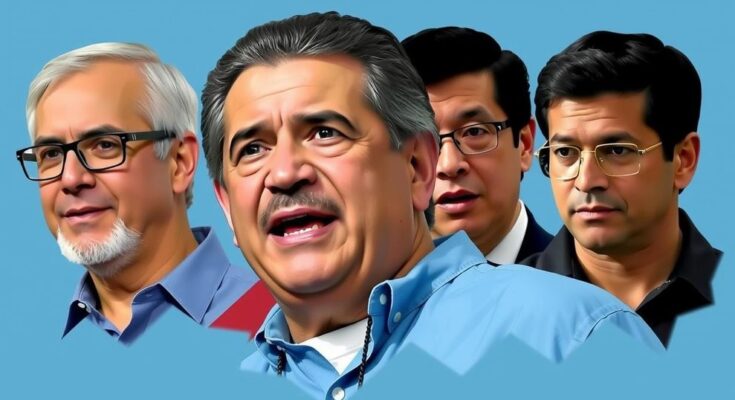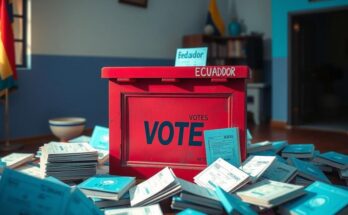Six Venezuelan opposition figures seek refuge in the former Argentine embassy amid escalating harassment and political crisis following the disputed July 2024 presidential election. Argentina, Brazil, and the OAS are pressing for safe passage for these individuals, while Maduro’s government continues to dismiss allegations of persecution. The situation highlights the urgent need for international intervention and regional cooperation to protect human rights amidst growing tensions in Venezuela.
The political unrest in Venezuela has escalated, particularly regarding six opposition figures who are currently seeking refuge in what used to be the Argentine embassy in Caracas. These individuals have reported alarming levels of harassment, which includes constant surveillance, the disruption of essential utilities, and the detention of local embassy personnel. Their situation has drawn international scrutiny in the wake of Venezuela’s contentious presidential election held in July 2024, which both President Nicolás Maduro and opposition leader María Corina Machado claim to have won. Argentina, Brazil, and the Organization of American States (OAS) are insisting on providing the group with safe passage out of the country amidst the prevailing tensions with the Maduro administration.
Since March 2024, the six opposition members, who attempted to escape persecution for their political activities, have resided in the former embassy. After the expulsion of Argentine diplomats from Venezuela, Brazil took over their guardianship in August. However, Maduro’s government revoked Brazil’s authority shortly after, complicating their already precarious situation and denying them security.
Among the opposition figures is Magalli Meda, who serves as the campaign manager for María Corina Machado. She publicly shared details of their dire living conditions during a recent online press conference, emphasizing the rising threats and intrusive surveillance by armed government agents. The situation became increasingly alarming when a longtime local Argentine embassy employee was detained, which Meda described as a blatant violation of their basic human rights. “We are seeing how the process of violating our basic human rights is accelerating. It’s urgent to stop this repression, whether psychological or physical.”
Despite the mounting international pressure, the Maduro administration maintains a defiant stance. Venezuelan Interior Minister Diosdado Cabello derisively labeled the opposition’s claims as a “farce,” demonstrating the government’s ongoing resistance to outside intervention concerning the predicament of the sheltered group.
The underlying tension stems from Venezuela’s disputed presidential election on July 28, in which the National Electoral Council, dominated by Maduro’s loyalists, falsely announced him as the victor without credible vote tabulations. In contrast, Machado’s team collected evidence asserting their candidate, Edmundo González, overwhelmingly led the polls, claiming he garnered double the votes attributed to Maduro. This political rift has prompted opposition figures to seek refuge to evade state-led repression.
Argentina and Brazil have taken initiatives to address the plight of these opposition leaders. Argentina’s government has been proactive, urging the OAS for diplomatic actions to ensure the group’s protection and safe exit. A substantial number of OAS member states have backed Argentina’s call for cessation of harassment directed toward the opposition.
Simultaneously, Brazilian leaders have sought to mediate the ongoing political impasse in Venezuela. Brazilian President Luiz Inácio Lula da Silva has underlined the need for coordinated negotiations with Maduro’s government despite Brazil’s revoked authority over the embassy. The ongoing harassment demonstrates a significant breach of diplomatic protocols, as the premises should remain protected from local law enforcement’s encroachment, barring any ambassadorial consent.
Pedro Urruchurtu, another opposition figure in the compound, voiced urgent appeals for regional nations to intensify their efforts to prevent further deterioration of the situation. He stated, “We ask Brazil and others to redouble their efforts, understanding that this situation can worsen. It demands the attention of the entire region.”
The precarious predicament of these six individuals not only reflects the intense human toll of Venezuela’s political crisis but signals the necessity for ongoing international advocacy. Unless regional governments enforce sustained pressure against Maduro to adhere to diplomatic and humanitarian standards, the safety of these opposition members remains perilously vulnerable amid an environment marked by state-sponsored persecution.
The political crisis in Venezuela has become a focal point of international concern, especially following a disputed presidential election in July 2024. With President Nicolás Maduro and opposition leader María Corina Machado both asserting victory, tensions have escalated into open conflict, leading to opposition figures seeking refuge in international diplomatic compounds. As situations like that of the six opposition members sheltering in the former Argentine embassy surface, a compelling narrative emerges around governmental actions versus international diplomatic norms and the need to protect human rights.
In conclusion, the plight of the six Venezuelan opposition figures residing in the former Argentine embassy underscores the intersection of political conflict and human rights. The escalating harassment they face, coupled with a lack of adherence to international norms by the Maduro government, necessitates urgent actions from Argentina, Brazil, and the OAS. Continued diplomatic pressure and collective regional effort are essential to ensure the safety of those at risk and to address the larger implications for Venezuelan democracy.
Original Source: www.newslooks.com




